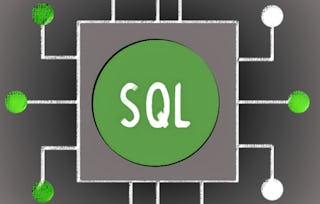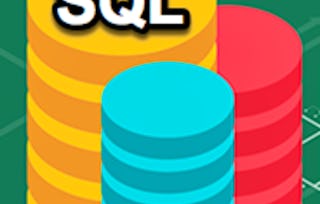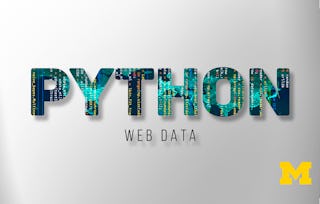This course will introduce students to the basics of the Structured Query Language (SQL) as well as basic database design for storing data as part of a multi-step data gathering, analysis, and processing effort. The course will use SQLite3 as its database. We will also build web crawlers and multi-step data gathering and visualization processes. We will use the D3.js library to do basic data visualization. This course will cover Chapters 14-15 of the book “Python for Everybody”. To succeed in this course, you should be familiar with the material covered in Chapters 1-13 of the textbook and the first three courses in this specialization. This course covers Python 3.

Using Databases with Python

Using Databases with Python
This course is part of Python for Everybody Specialization

Instructor: Charles Russell Severance
539,214 already enrolled
Included with
21,558 reviews
What you'll learn
Use the Create, Read, Update, and Delete operations to manage databases
Explain the basics of Object Oriented Python
Understand how data is stored across multiple tables in a database
Utilize the Google Maps API to visualize data
Skills you'll gain
Details to know

Add to your LinkedIn profile
5 assignments
See how employees at top companies are mastering in-demand skills

Build your subject-matter expertise
- Learn new concepts from industry experts
- Gain a foundational understanding of a subject or tool
- Develop job-relevant skills with hands-on projects
- Earn a shareable career certificate

There are 5 modules in this course
To start this class out we cover the basics of Object Oriented Python. We won't be writing our own objects, but since many of the things we use like BeautifulSoup, strings, dictionaries, database connections all use Object Oriented (OO) patterns we should at least understand some of its patterns and terminology.
What's included
12 videos4 readings2 assignments
We learn the four core CRUD operations (Create, Read, Update, and Delete) to manage data stored in a database.
What's included
6 videos1 assignment2 app items
In this section we learn about how data is stored across multiple tables in a database and how rows are linked (i.e., we establish relationships) in the database.
What's included
8 videos1 assignment1 app item
In this section we explore how to model situations like students enrolling in courses where each course has many students and each student is enrolled in many courses.
What's included
4 videos1 assignment1 app item
In this section, we put it all together, retrieve and process some data and then use the OpenStreetMaps API to visualize our data.
What's included
5 videos3 readings1 app item
Earn a career certificate
Add this credential to your LinkedIn profile, resume, or CV. Share it on social media and in your performance review.
Instructor

Offered by
Explore more from Software Development
 Status: Free Trial
Status: Free TrialDuke University
 Status: Free Trial
Status: Free Trial Status: Free Trial
Status: Free TrialMeta
 Status: Free Trial
Status: Free TrialUniversity of Michigan
Why people choose Coursera for their career

Felipe M.

Jennifer J.

Larry W.

Chaitanya A.
Learner reviews
- 5 stars
82.13%
- 4 stars
14.17%
- 3 stars
2.26%
- 2 stars
0.47%
- 1 star
0.94%
Showing 3 of 21558
Reviewed on Jul 24, 2018
The course is simple and easy.Dr.Chuck takes you through databases,how to write SQL queries,execute them and so on.My advice is to do the other three courses first and then move on to this one.
Reviewed on Jul 5, 2018
Well taught course, with material made easy to understand and discussed in an engaging way. The assignments really help to solidify your understanding and are like puzzles that I enjoy working at.
Reviewed on Nov 21, 2017
the way this course is design is absolutely amiziong. just good amount of most important information is provided. task are not too complecated to finish (maybe coudl be little more dificult:) love it!

Open new doors with Coursera Plus
Unlimited access to 10,000+ world-class courses, hands-on projects, and job-ready certificate programs - all included in your subscription
Advance your career with an online degree
Earn a degree from world-class universities - 100% online
Join over 3,400 global companies that choose Coursera for Business
Upskill your employees to excel in the digital economy
Frequently asked questions
To access the course materials, assignments and to earn a Certificate, you will need to purchase the Certificate experience when you enroll in a course. You can try a Free Trial instead, or apply for Financial Aid. The course may offer 'Full Course, No Certificate' instead. This option lets you see all course materials, submit required assessments, and get a final grade. This also means that you will not be able to purchase a Certificate experience.
When you enroll in the course, you get access to all of the courses in the Specialization, and you earn a certificate when you complete the work. Your electronic Certificate will be added to your Accomplishments page - from there, you can print your Certificate or add it to your LinkedIn profile.
Yes. In select learning programs, you can apply for financial aid or a scholarship if you can’t afford the enrollment fee. If fin aid or scholarship is available for your learning program selection, you’ll find a link to apply on the description page.
More questions
Financial aid available,

